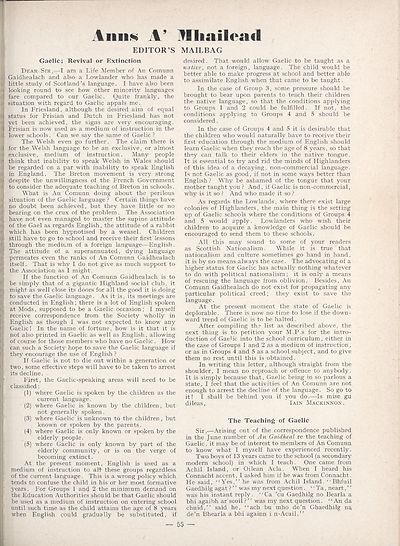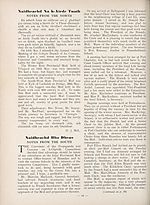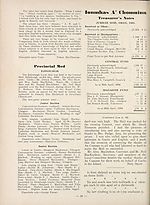An Comunn Gàidhealach Publications > Gaidheal > Volume 49--51, January 1954--December 1956
(117) Page 55
Download files
Complete book:
Individual page:
Thumbnail gallery: Grid view | List view

Ahum A’ iVIliaiload
EDITOR’S MAILBAG
Gaelic: Revival or Extinction
Dear Sir,—I am a Life Member of An Comunn
Gaidhealach and also a Lowlander who has made a
little study of Scotland’s language. I have also been
looking round to see how other minority languages
fare compared to our Gaelic. Quite frankly, the
situation with regard to Gaelic appals me.
In Friesland, although the desired aim of equal
status for Frisian and Dutch in Friesland has not
yet been achieved, the signs are very encouraging.
Frisian is now used as a medium of instruction in the
lower schools. Can we say the same of Gaelic ?
The Welsh even go further. The claim there is
for the Welsh language to be an exclusive, or almost
exclusive, medium of instruction. Many people
think that inability to speak Welsh in Wales should
be regarded on a par with inability to speak English
in England. The Breton movement is very' strong
despite the unwillingness of the French Government
to consider the adequate teaching of Breton in schools.
What is An Comunn doing about the perilous
situation of the Gaelic language ? Certain things have
no doubt been achieved, but they have little or no
bearing on the crux of the problem. The Association
have not even managed to master the supine attitude
of the Gael as regards English, the attitude of a rabbit
which has been hypnotised by a weasel. Children
still have to go to school and receive their firstTessons
through the medium of a foreign language—English.
The attitude of a superannuated, dying language
permeates even the ranks of An Comunn Gaidhealach
itself. That is why I do not give as much support to
the Association as I might.
If the function of An Comunn Gaidhealach is to
be simply that of a gigantic Highland social club, it
might as well close its doors for all the good it is doing
to save the Gaelic language. As it is, its meetings are
conducted in English; there is a lot of English spoken
at Mods, supposed to be a Gaelic occasion; I myself
receive correspondence from the Society wholly in
English as though I was not expected to know any
Gaelic! In the name of fortune, how is it that it is
not also printed in Gaelic as well as English, allowing
of course for those members who have no Gaelic. How
can such a Society hope to save the Gaelic language if
they encourage the use of English ?
If Gaelic is not to die out within a generation or
two, some effective steps will have to be taken to arrest
its decline.
First, the Gaelic-speaking areas will need to be
classified:
(1) where Gaelic is spoken by the children as the
current language.
■ (2) where Gaelic is known by the children, but
not generally spoken.
(3) where Gaelic is unknown to the children, but
known or spoken by the parents.
(4) where Gaelic is only known or spoken by the
elderly people.
(5) where Gaelic is only known by part of the
elderly community, or is on the verge of
becoming extinct.
At the present moment, English is used as a
medium of instruction to ali these groups regardless
of the current language. This is a wrong policy which
tends to confuse the child in his or her most formative
years. For Groups 1 and 2 the minimum demand on
the Education Authorities should be that Gaelic should
be used as a medium of instruction on entering school
until such time as the child attains the age of 8 years
when English could gradually be substituted, if
desired. That would allow Gaelic to be taught as a
native, not a foreign, language. The child would be
better able to make progress at school and better able
to assimilate English when that came to be taught.
In the case of Group 3, some pressure should be
brought to bear upon parents to teach their children
the native language, so that the conditions applying
to Groups 1 and 2 could be fulfilled. If not, the
conditions applying to Groups 4 and 5 should be
considered.
In the case of Groups 4 and 5 it is desirable that
the children who would naturally have to receive their
first education through the medium of English should
learn Gaelic when they reach the age of 8 years, so that
they can talk to their elders in the native tongue.
It is essential to try and rid the minds of Highlanders
of this idea of a decaying, non-commercial language.
Is not Gaelic as good, if not in some ways better than
English ? Why be ashamed of the tongue that your
mother taught you ? And, if Gaelic is non-commercial,
why is it so ? And who made it so ?
As regards the Lowlands, where there exist large
colonies of Highlanders, the main thing is the setting
up of Gaelic schools where the conditions of Groups 4
and 5 would apply. Low landers who wish their
children to acquire a knowledge of Gaelic should be
encouraged to send them to these schools.
All this may sound to some of your readers
as Scottish Nationalism. While it is true that
nationalism and culture sometimes go hand in hand,
it is by no means always the case. The advocating of a
higher status for Gaelic has actually nothing whatever
to do with political nationalism; it is only a means
of rescuing the language from oblivion. Besides, An
Comunn Gaidhealach do not exist for propagating any
particular political creed; they exist to save the
language.
At the present moment the state of Gaelic is
deplorable. There is now no time to lose if the down¬
ward trend of Gaelic is to be halted.
After compiling th? list as described above, the
next thing is to petition your M.P.s for the intro¬
duction of Gaelic into the school curriculum, either in
the case of Groups 1 and 2 as a medium of instruction,
or as in Groups 4 and 5 as a school subject, and to give
them no rest until this is obtained.
In writing this letter, although straight from the
shoulder, I mean no reproach or offence to anybody.
It is simply because that, Gaelic being in so parlous a
state, I feel that the activities of An Comunn are not
enough to arrest the decline of the language. So go to
it! I shall be behind you if you do.—Is mise gu
dileas, Iain Mackinnon .
The Teaching of Gaelic
Sir,—Arising out of the correspondence published
in the June number oi An Gaidheal re the teaching of
Gaelic, it may be of interest to members of An Comunn
to know what I myself have experienced recently.
Two boys of 13 years came to the school (a secondary
modern school) in which I teach. One came from
Achil Island, or Oilcan Acla. When I heard his
Connacht accent, I asked him if he was from Connacht.
He said, “Yes,” he was from Achil Island. “Bhfuil
Gaedhilg agat ? ’ ’ was my next question. “ Ta, neart, ’ ’
was his instant reply. “Ca 'cu Gaedhilg no Bearla a
bhi agaibh ar'scoil ? ’ ’ was my next question. ‘ ‘ An da
chuid,” said he, “ach bu mho de’n Ghaedhilg na
de’n Bhearla a bhi againn i n-Acail,”
EDITOR’S MAILBAG
Gaelic: Revival or Extinction
Dear Sir,—I am a Life Member of An Comunn
Gaidhealach and also a Lowlander who has made a
little study of Scotland’s language. I have also been
looking round to see how other minority languages
fare compared to our Gaelic. Quite frankly, the
situation with regard to Gaelic appals me.
In Friesland, although the desired aim of equal
status for Frisian and Dutch in Friesland has not
yet been achieved, the signs are very encouraging.
Frisian is now used as a medium of instruction in the
lower schools. Can we say the same of Gaelic ?
The Welsh even go further. The claim there is
for the Welsh language to be an exclusive, or almost
exclusive, medium of instruction. Many people
think that inability to speak Welsh in Wales should
be regarded on a par with inability to speak English
in England. The Breton movement is very' strong
despite the unwillingness of the French Government
to consider the adequate teaching of Breton in schools.
What is An Comunn doing about the perilous
situation of the Gaelic language ? Certain things have
no doubt been achieved, but they have little or no
bearing on the crux of the problem. The Association
have not even managed to master the supine attitude
of the Gael as regards English, the attitude of a rabbit
which has been hypnotised by a weasel. Children
still have to go to school and receive their firstTessons
through the medium of a foreign language—English.
The attitude of a superannuated, dying language
permeates even the ranks of An Comunn Gaidhealach
itself. That is why I do not give as much support to
the Association as I might.
If the function of An Comunn Gaidhealach is to
be simply that of a gigantic Highland social club, it
might as well close its doors for all the good it is doing
to save the Gaelic language. As it is, its meetings are
conducted in English; there is a lot of English spoken
at Mods, supposed to be a Gaelic occasion; I myself
receive correspondence from the Society wholly in
English as though I was not expected to know any
Gaelic! In the name of fortune, how is it that it is
not also printed in Gaelic as well as English, allowing
of course for those members who have no Gaelic. How
can such a Society hope to save the Gaelic language if
they encourage the use of English ?
If Gaelic is not to die out within a generation or
two, some effective steps will have to be taken to arrest
its decline.
First, the Gaelic-speaking areas will need to be
classified:
(1) where Gaelic is spoken by the children as the
current language.
■ (2) where Gaelic is known by the children, but
not generally spoken.
(3) where Gaelic is unknown to the children, but
known or spoken by the parents.
(4) where Gaelic is only known or spoken by the
elderly people.
(5) where Gaelic is only known by part of the
elderly community, or is on the verge of
becoming extinct.
At the present moment, English is used as a
medium of instruction to ali these groups regardless
of the current language. This is a wrong policy which
tends to confuse the child in his or her most formative
years. For Groups 1 and 2 the minimum demand on
the Education Authorities should be that Gaelic should
be used as a medium of instruction on entering school
until such time as the child attains the age of 8 years
when English could gradually be substituted, if
desired. That would allow Gaelic to be taught as a
native, not a foreign, language. The child would be
better able to make progress at school and better able
to assimilate English when that came to be taught.
In the case of Group 3, some pressure should be
brought to bear upon parents to teach their children
the native language, so that the conditions applying
to Groups 1 and 2 could be fulfilled. If not, the
conditions applying to Groups 4 and 5 should be
considered.
In the case of Groups 4 and 5 it is desirable that
the children who would naturally have to receive their
first education through the medium of English should
learn Gaelic when they reach the age of 8 years, so that
they can talk to their elders in the native tongue.
It is essential to try and rid the minds of Highlanders
of this idea of a decaying, non-commercial language.
Is not Gaelic as good, if not in some ways better than
English ? Why be ashamed of the tongue that your
mother taught you ? And, if Gaelic is non-commercial,
why is it so ? And who made it so ?
As regards the Lowlands, where there exist large
colonies of Highlanders, the main thing is the setting
up of Gaelic schools where the conditions of Groups 4
and 5 would apply. Low landers who wish their
children to acquire a knowledge of Gaelic should be
encouraged to send them to these schools.
All this may sound to some of your readers
as Scottish Nationalism. While it is true that
nationalism and culture sometimes go hand in hand,
it is by no means always the case. The advocating of a
higher status for Gaelic has actually nothing whatever
to do with political nationalism; it is only a means
of rescuing the language from oblivion. Besides, An
Comunn Gaidhealach do not exist for propagating any
particular political creed; they exist to save the
language.
At the present moment the state of Gaelic is
deplorable. There is now no time to lose if the down¬
ward trend of Gaelic is to be halted.
After compiling th? list as described above, the
next thing is to petition your M.P.s for the intro¬
duction of Gaelic into the school curriculum, either in
the case of Groups 1 and 2 as a medium of instruction,
or as in Groups 4 and 5 as a school subject, and to give
them no rest until this is obtained.
In writing this letter, although straight from the
shoulder, I mean no reproach or offence to anybody.
It is simply because that, Gaelic being in so parlous a
state, I feel that the activities of An Comunn are not
enough to arrest the decline of the language. So go to
it! I shall be behind you if you do.—Is mise gu
dileas, Iain Mackinnon .
The Teaching of Gaelic
Sir,—Arising out of the correspondence published
in the June number oi An Gaidheal re the teaching of
Gaelic, it may be of interest to members of An Comunn
to know what I myself have experienced recently.
Two boys of 13 years came to the school (a secondary
modern school) in which I teach. One came from
Achil Island, or Oilcan Acla. When I heard his
Connacht accent, I asked him if he was from Connacht.
He said, “Yes,” he was from Achil Island. “Bhfuil
Gaedhilg agat ? ’ ’ was my next question. “ Ta, neart, ’ ’
was his instant reply. “Ca 'cu Gaedhilg no Bearla a
bhi agaibh ar'scoil ? ’ ’ was my next question. ‘ ‘ An da
chuid,” said he, “ach bu mho de’n Ghaedhilg na
de’n Bhearla a bhi againn i n-Acail,”
Set display mode to:
![]() Universal Viewer |
Universal Viewer | ![]() Mirador |
Large image | Transcription
Mirador |
Large image | Transcription
| An Comunn Gàidhealach > An Comunn Gàidhealach Publications > Gaidheal > Volume 49--51, January 1954--December 1956 > (117) Page 55 |
|---|
| Permanent URL | https://digital.nls.uk/127173825 |
|---|
| Description | This contains items published by An Comunn, which are not specifically Mòd-related. It includes journals, annual reports and corporate documents, policy statements, educational resources and published plays and literature. It is arranged alphabetically by title. |
|---|
| Description | A collection of over 400 items published by An Comunn Gàidhealach, the organisation which promotes Gaelic language and culture and organises the Royal National Mòd. Dating from 1891 up to the present day, the collection includes journals and newspapers, annual reports, educational materials, national Mòd programmes, published Mòd literature and music. |
|---|---|
| Additional NLS resources: |
|

